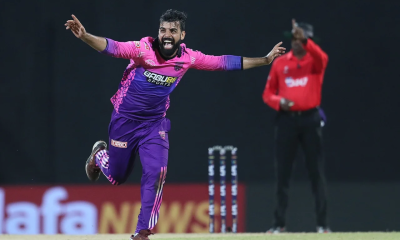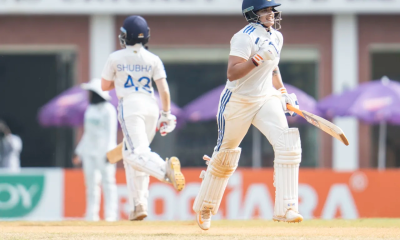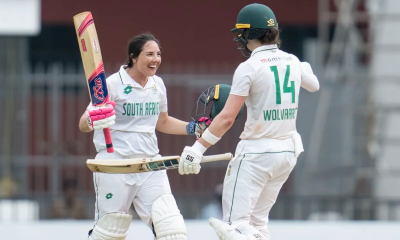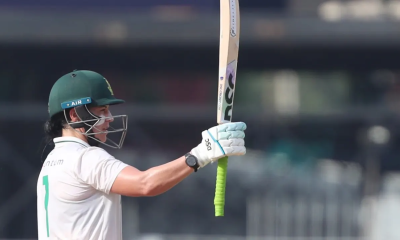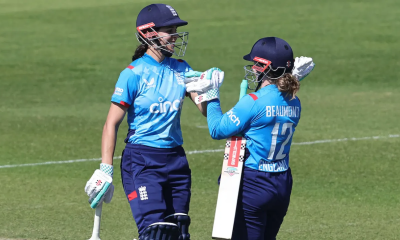Sports
Wanindu Hasaranga conundrum
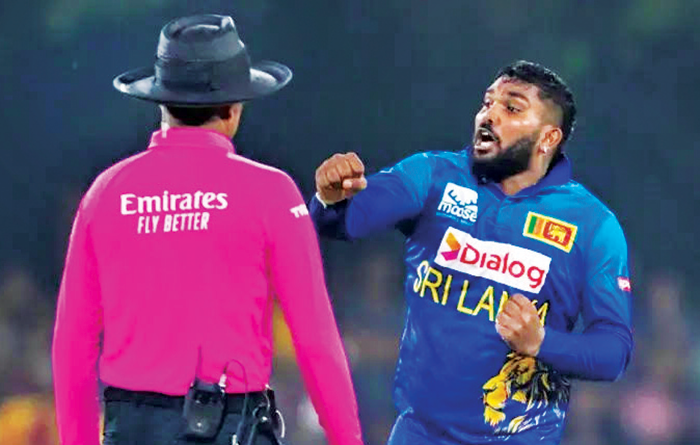
by Rex Clementine
When your star player gets suspended twice within a month, that’s not ideal. When he is your captain, you have serious problems to deal with. We are talking about Wanindu Hasaranga here, whose constant altercations with match officials have landed him in trouble.
First he took on local umpire Lyndon Hannibal for not calling a high full toss no ball in the third T-20 International against Afghanistan. He was charged for dissent, pleaded guilty and was suspended for two games. That resulted in him being left out for the first two T-20 Internationals and Charith Asalanka debuted as captain in Bangladesh. He proved to be a level-headed leader. A need of the hour.
Then in the third ODI against Bangladesh before he was carted all over the park, he got into another altercation with Bangladeshi umpire Tanvir Ahmed. This time the umpire had turned down a leg before shout. The Sri Lankans reviewed and it was an umpire’s call.
The Sri Lankans felt Rishad Hossain had been let off. Rightly so. They had all the reasons to be upset with the decision for Rishad turned the game on its head smashing 48 off 18 balls. Not only did the game slip away from Sri Lanka but they lost the series too.
You do feel for Hasaranga and the Sri Lankans. Umpire Richard Kettleborough was unwell which meant that local umpire Tanvir Ahmed had to replace him. A few decisions had cost the Sri Lankans dearly that night. Pathum Nissanka had been given out wrongly. A decision the batsman did not review.
Bangladesh coach Chandika Hathurusinghe may have used the playing conditions to his side’s advantage when he applied for concussion substitute and the appeal for Soumya Sarkar to be replaced by Tanzid Hasan was granted.
So how did Hathurusingha asking for concussion substitute help Bangladesh? Well, it was a hot day in Chittagong and Sarkar had fielded for 49 overs when Sri Lanka were batting. Fatigue could have got the better of him when it was Bangladesh’s chance to chase. Tanzid meanwhile was fresh and top scored during the run chase with 84 runs.
Sri Lanka were bemused. How can you apply for concussion substitute for injury not related to the head?
Sri Lanka had quite a few axes to grind with the way things were going for them during the series. But does that mean that Hasaranga is allowed to behave the way he did?
Apparently, the player used the four-letter word at the umpire. The umpire too responded with a jibe. He made matters worse for the Sri Lankans by charging the player for dissent after the game. Hathurusinghe, allegedly, told the local umpires to charge the bowler.
These teams will meet each other during the T-20 World Cup and Bangladesh wouldn’t want to play against Hasaranga.
The moment Hasaranga pleaded guilty, he was staring down the barrel facing a suspension of four white ball games as it was his second suspension.
The night he was charged, the Test squad was named and Hasaranga was in it. This fueled speculation that Hasaranga was drafted into the Test squad in order to help him to serve the ban during the Test series. Sitting out a Test match is equal to two white ball games and when Wanindu misses out both Tests, he has served his suspension and will be fully available for the World Cup.
Some have claimed that this was a clever move by the team management. Some have criticized the move saying that loopholes in the system had been exploited. However, the fact remains that Hasaranga had written to SLC CEO Ashley de Silva making himself available for selection in Test cricket long before he got into trouble in Chittagong. He had last year retired from Tests after being overlooked for the longer format of the game by the previous selectors on numerous occasions. New selectors and change of heart from Hasaranga.
Interestingly, Hasaranga had not played a First-Class game for more than a year now. Whether the selectors would have named him in the squad soon after he came out of retirement in normal circumstances is a question for debate.
However, what is not in debate is successive Sri Lankan teams exploiting the escape clauses to their benefit.
There was the famous captaincy switch in 2012 during the World T-20. Captain Mahela Jayawardene was facing suspension for slow over rate and Sri Lanka introduced Kumar Sangakkara as captain saving MJ from a suspension for the knockouts.
Eventually, the ICC had to alter playing conditions after the incident. Hasaranga incident also will make them to sit down and chat.
What is not acceptable though is you doing all these stuff conveniently and suddenly waking up from a slumber and accusing others for trying to take advantage of the system or existing laws those have inadequacies. Suddenly, the Sri Lankans become the guardians of Spirit of Cricket.
If you exploit the system, you’ll find others following suit too. At that point you should not be shedding crocodile tears pleading for fair play. That’s where Sri Lanka have got things horribly wrong. They have failed to take things on the chin and move on.
As for Hasaranga, he is a champion player. He has won Sri Lanka a lot of games single-handedly and he’s going to do the same moving forward. But he needs to calm down. His constant run-ins with match officials is unacceptable. Sri Lanka do not want a situation where their best player is sitting out of important games due to discipline issues.
Here’s the other point. He has become a bit of a troublemaker taking on the umpires but is he going to take other authorities too to task. You certainly do not want a situation where he is constantly berating selectors, coaching staff, administration and even own teammates. This is an opportunity for people to nip things in the bud and not let things get out of hand.
Your best player doesn’t need to be your captain always. Lasith Malinga was an outstanding bowler but was a lousy captain. Sachin Tendulkar is the greatest batsman this generation has seen, but his two stints as captain of India weren’t so great. Similarly, Brian Lara, was a class act with the bat but hopeless as a captain.
Hasaranga is certainly Sri Lanka’s biggest star at the moment in white ball cricket. But is he your best choice as captain? Yes, he won the Lanka Premier League last year and not many people gave his side a chance. But should that have been the only reason to hand him the T-20 captaincy? Hadn’t we groomed Charith Asalanka from a young age for captaincy? These are some of the questions that need to be answered.
Sports
Shanaka fireworks helps Sri Lanka thrash Oman
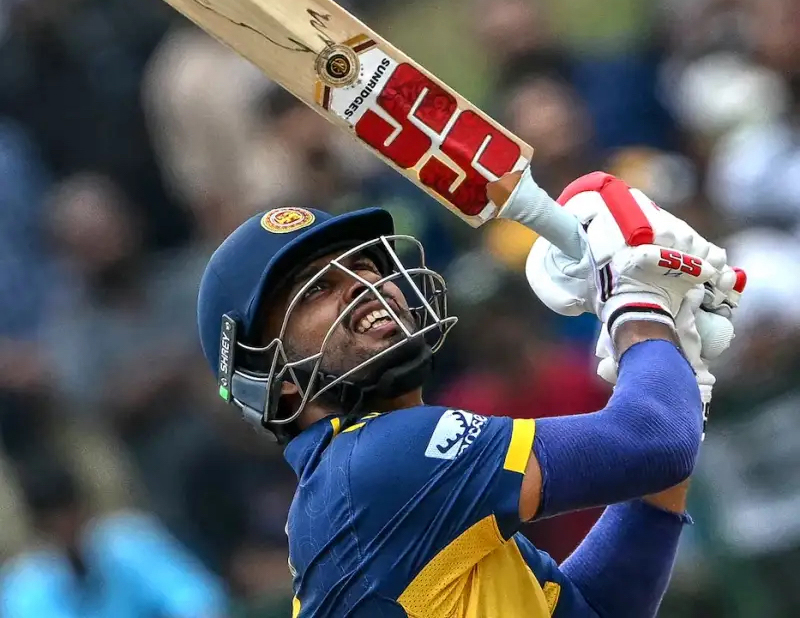
Dasun Shanaka hammered the fastest half-century by a Sri Lankan in T20Is as the co-hosts thrashed Oman by 105 runs at the T20 World Cup on Thursday in Pallekele for their second win in Group B.
The 2014 champions piled up 225-5, the highest total of the tournament, before restricting an outclassed Oman to 120-9.
The 43-year-old Mohammad Nadeem waged a lone battle for Oman, compiling an unbeaten 53 to become the oldest player to score a fifty in T20 World Cups.
Having promoted himself up the order and under pressure to deliver, Sri Lanka skipper Shanaka smashed a 19-ball half-century.
It has been a bruising few months for the out-of-form Shanaka since reclaiming the captaincy late last year.
But on a batting-friendly pitch he smacked the Oman bowlers to all corners of the park, peppering the stands with five sixes and two fours.
Before that, Pavan Rathnayake and Kusal Mendis laid the foundation as the pair each posted fluent half-centuries, stitching together a 94-run stand for the third wicket.
Once the platform was set, Kamindu Mendis applied the finishing touches.
Fresh from his match-turning cameo in the win over Ireland, the left-hander scored an unbeaten 19 off just seven deliveries, striking one four and two sixes.
Oman were never really in the game as they fell to a second defeat at the tournament.
Sri Lanka spinner Maheesh Theekshana shared the new ball with Dushmantha Chameera and they accounted for two wickets apiece.
by Rex Clementine ✍️
Sports
Damesh produces best all-round feat

Under 19 Cricket
Damesh Mathisan produced the best all round performance of the season as St. Joseph Vaz’s Wennappuwa (325/8 decl. & 178/9 decl.) took major honors taking first innings points against Isipatana (301 & 72/3) in the Under 19 Division I Tier B match at Colts Ground on Thursday.
Mathisan followed up his aggressive century (144) in the first innings with a six wicket haul that ensured the visitors of first innings points.
The spinner, who opened bowling, took six wickets (21.4-3-52-6) in the first innings. It was the fifth time he has taken more than five wickets in an innings.
His best bowling performances of the season include two match bags of ten wickets (Wesley & De Mazenod).
With the bat he has two centuries against his name.
In the Tier A tournament, Chamika Heenatigala marked his return from Sri Lanka Under 19 duty with an unbeaten century as Mahanama took first innings points against S. Thomas’ at Mount Lavinia.
Kaveesha Perera with a top score of 121 runs (for St. Sebastian’s – 304/6 against DSS) and Asadisa de Silva with 109 runs (for St. Peter’s 282/5 against Gurukula) were the other batsmen to make notable contributions with the bat in Tier A tournament.
by Reemus Fernando
Latest News
Moscas star as Italy dismantle Nepal for first World Cup win
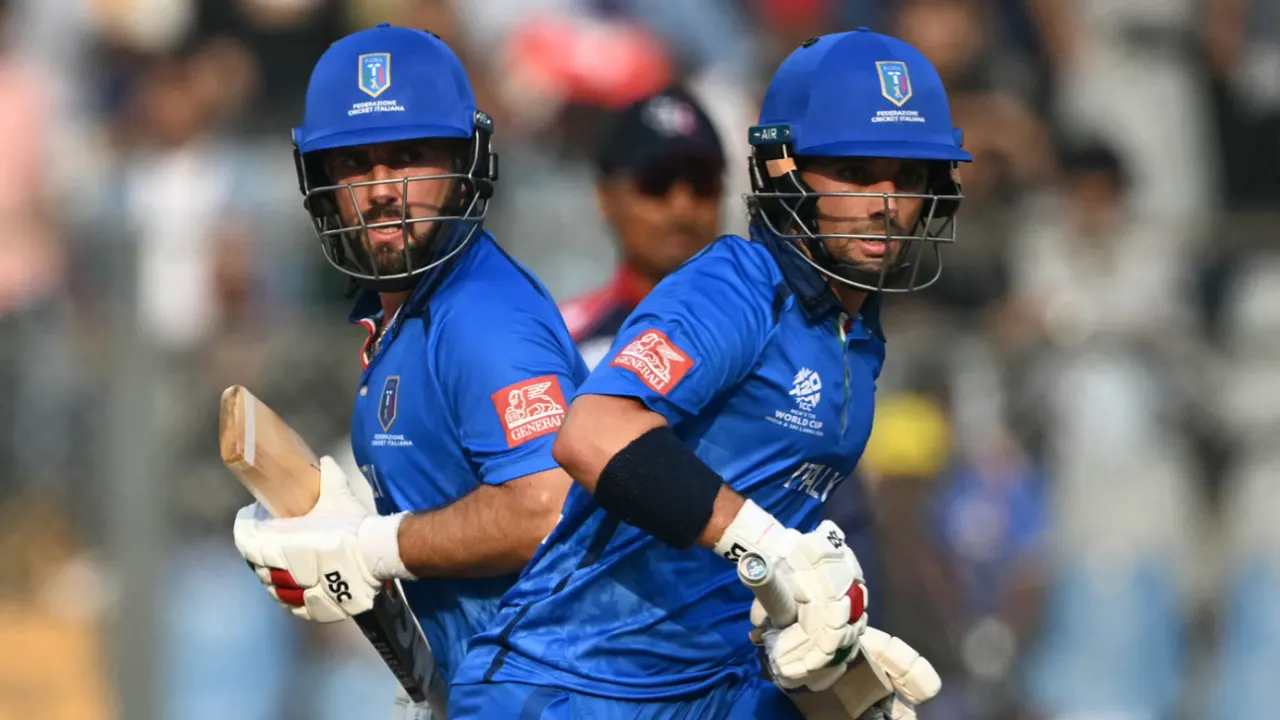
In only their second World Cup outing, Italy claimed a clinical first win, silencing a largely Nepal supporting crowd in Mumbai. After the bowlers restricted Nepal effectively on a worn surface, Italy’s opening pair, the Sydney-raised brothers, Justin and Anthony Mosca, then rampaged to the target on their own, both notching half-centuries to seal victory with more than seven overs to spare.
Nepal, having run England so close in their opening match, came in as the favoured side – in terms of both their pedigree at global events and the backing in the stands. But they struggled to get going with the bat after being inserted, with Aasif Sheikh’s 27 off 24 the top score of an underpowered effort. Italy’s spin attack were superb, Crishan Kalugamage , Ben Meneti and JJ Smuts claiming combined figures of 6 for 49 from their 12 overs.
Needing to score at little more than a run a ball, Italy were in no mood to get bogged down. Anthony Mosca hammered his second ball for a towering six over midwicket and, after a slower start, Justin soon joined his brother in targeting the boundary. Justin was the first to 50, from 37 balls, with Anthony bringing up the milestone from just 28 balls with another blazing slog-sweep moments later. It was Anthony who completed the Italian job with a single into the covers to spark jubilation on the sidelines.
The Wankhede is used to dominant displays from a team in blue, but few would have expected such a thrashing to be handed out by the Azzurri. Not least because they came into this match without their captain, Wayne Madsen, and having suffered a heavy defeat to Scotland in their opening match in Kolkata. Nepal, meanwhile, we looking to record their third win in T20 World Cups – and first since 2014.
Given their strengths, Nepal might have fancied their chances defending a low total on the same surface where spin played such a key role in Wednesday’s game between West Indies and England – but any such thoughts were quickly dispelled. Anthony Mosca, the elder brother, was particularly brutal in taking apart an experienced Nepal attack, while both openers used the crease intelligently to target scoring opportunities.
Having needed a few balls to get in, Justin Mosca took 14 off Karan KC’s second over, then the brothers traded sixes off Lalit Rajbanshi’s only over to raise Italy’s 50 at the end of the fourth over. Even the early introduction of Nepal’s trump card, legspinner Sandeep Lamichhane, could not slow the Moscas’ advance, as Anthony cleared long-off and then dragged past short fine leg to leave Italy 68 for 0 at the end of the powerplay.
From there, with 56 required off 84, they could tick along towards individual milestones – and by reaching the target in tandem, they recorded the highest partnership between siblings in all T20 internationals, beating the 119 added by Kathryn and Sarah Bryce for Scotland against Netherlands at the 2019 Women’s T20 World Cup qualifier.
Italy’s victory was a family affair, with Harry Manenti – younger brother of Ben – standing in for the injured Madsen as captain. “Our goal was always to compete at this level,” Harry said afterwards. “We didn’t quite nail it the other day [against Scotland] but we showed the world what we’ve got.”
T20 isn’t the format that naturally lends itself to catenaccio – the famed Italian approach to football which is focused on defence – but Italy went about restricting Nepal superbly after opting to bowl first. The surface was the same as that used for West Indies’ win over England the night before, and stroke-making looked to be a challenge as Ben Manenti started with a maiden over to Kushal Bhurtel.
Bhurtel took eight balls to get off the mark, found the boundary with his ninth and then was dismissed from his tenth, miscuing a slash off Ali Hasan straight to cover point. Nepal were 10 for 1 after three overs, but got going with Aasif Sheikh picking up back-to-back boundaries in Hasan’s second over. Paudel then got the crowd on their feet with sixes off JJ Smuts and Grant Stewart, as they ended the powerplay in better shape on 46 for 1.
However, Italy returned to spin and reapplied the defensive press. Paudel was dismissed in Crishan Kalugamage’s first over, hoicking a googly to long-on, and two balls later both set batters were gone: Aasif Sheikh overbalanced against Manenti’s arm ball, leaving his toe on the line as Gian-Piero Meade whipped off the bails.
A hard-running partnership of 44 off 39 ensued between Aarif Sheikh and Dipendra Singh Airee. Just three boundaries were scored between the end of the powerplay and the fifth ball of the 18th over as Nepal scrambled to get a score on the board. Airee had helped take down Adil Rashid as they gave England a scare, but he struggled for timing this time around before being bowled by Italy’s legspinner, Kalugamage smuggling a googly through the gap to hit off stump.
That triggered a disastrous collapse, from 93 for 3 to 102 for 8. Lokesh Bam hauled Ben Manenti to deep midwicket, Aarif Sheikh picked out deep backward square leg off Smuts and Kalugamage bagged a third when Gulsan Jha holed out to long-on. Some shoddy running did for Nandan Yadav. Karan KC nailed the returning Hasan for six and four to briefly re-energise the Nepali support in the stands, but two wickets in three balls at the start of the 19th saw them bowled out short of their allocation.
Brief scores:
Italy 124 for 0 in 12.4 overs (Anthony Mosca 62*, Justin Mosca 60*) beat Nepal 123 in 19.3 overs (Aasif Sheikh 20, Rohit Paudel 23, Dipendra Singh Airee 17, Aarif Sheikh 27, Karan KC 18; Ben Manenti 2-09, Ali Hasan 1-34,JJ Smuts 1-22, Crishan Kalugamage 3-18, Jasprit Singh 1-08) by 10 wickets
[Cricinfo]
-

 Features5 days ago
Features5 days agoMy experience in turning around the Merchant Bank of Sri Lanka (MBSL) – Episode 3
-

 Business6 days ago
Business6 days agoZone24x7 enters 2026 with strong momentum, reinforcing its role as an enterprise AI and automation partner
-

 Business5 days ago
Business5 days agoRemotely conducted Business Forum in Paris attracts reputed French companies
-

 Business5 days ago
Business5 days agoFour runs, a thousand dreams: How a small-town school bowled its way into the record books
-

 Business5 days ago
Business5 days agoComBank and Hayleys Mobility redefine sustainable mobility with flexible leasing solutions
-

 Business2 days ago
Business2 days agoAutodoc 360 relocates to reinforce commitment to premium auto care
-

 Business6 days ago
Business6 days agoHNB recognized among Top 10 Best Employers of 2025 at the EFC National Best Employer Awards
-

 Midweek Review2 days ago
Midweek Review2 days agoA question of national pride




